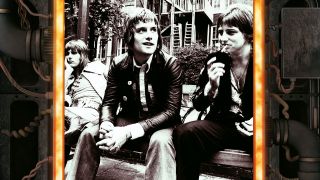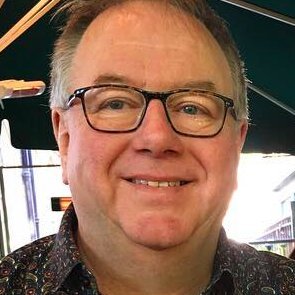Brain Salad Surgery is the group at the pinnacle of its powers,” says drummer Carl Palmer of Emerson Lake & Palmer’s fifth album. “It’s very well recorded and it was definitely one of our most creative periods. If I had to choose one of our albums, that would be the one.”
It’s a viewpoint echoed by his erstwhile bandmates. Keyboard player Keith Emerson sees it as a “step forward from the past”, which “represented the camaraderie of the band at the time”. Bass player and vocalist Greg Lake reckons that it was “the last original, unique ELP album”.
The album was released in late 1973, by which time the group were, in Lake’s words, “already huge”. One of the first so-called supergroups, formed from members of The Nice, King Crimson and Atomic Rooster, Emerson Lake & Palmer’s rapid rise to fame swept aside the old notion of ‘paying your dues’. Although all three musicians had endured times of schlepping up and down motorways in a transit van, the newly formed trio’s first gig was at the Plymouth Guildhall, followed by a second at the 1970 Isle Of Wight Festival. From then on, superficially at least, it all seemed so easy. “It looked to some like we were the sons of famous fathers and didn’t have to work to get there,” quips Lake.
Their fourth album, 1972’s Trilogy, had reached Number Two in the UK and Number Five the USA, but in rehearsing and arranging the music for Brain Salad Surgery, ELP made a decision to pursue a quite different approach. “Music technology was really expanding,” Lake explains. “Tape recorders were going from 8-track to 24-track. We took advantage of the new possibilities and did a lot of overdubbing. But being a three-piece band, when we played it live on tour, it didn’t really sound as good as the record, so we made sure we could perform the next album live before we had even recorded it.”
The group had bought a cinema in Fulham, which they renamed the Manticore Cinema, and they rented it out as storage and rehearsal space to groups. But in the rehearsals for Brain Salad Surgery, they left their gear set up on stage and rehearsed it as if playing a live show.
The album was recorded in Advision and Olympic Studios, with Lake on production duties. None of the musicians remembers much about the studio sessions due to the fact that, because the band were well rehearsed and ready to go, they were over relatively quickly. “It’s probably the most inventive album we made,” Palmer says. “But you don’t realise that at the time you’re making it as you’re so wrapped up in it. And you never know quite how it will turn out.”
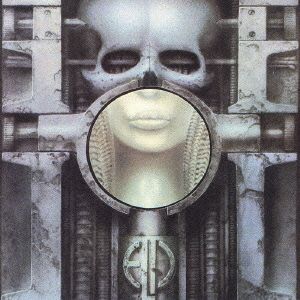
Compared to the brighter, more open sound, of Trilogy and Tarkus from 1971, Brain Salad Surgery is tougher and darker, or at least more shadowy. Lake agrees and thinks this could be down to a couple of factors. Eddy Offord, who had engineered their previous albums, was absent, and so that task fell to Chris Kimsey and Jeff Young.
“Firstly, every engineer has a palette,” says Lake, “and it’s amazing how different a group can sound in different studios. Secondly, unlike the previous albums, Brain Salad Surgery is almost a live recording done in a studio. The sound was quite raw and quite ambient."
It opens in a blaze of light, though, with a flamboyant version of William Blake and Hubert Parry’s Jerusalem, with Palmer playing gongs and timpani, and executing lavish multiple tom-tom rolls around his stainless steel kit. Emerson garnishes proceedings with exultant Moog clarion calls, while Lake’s magisterial voice holds the middle ground.
In the early 70s, the BBC were far more censorious than they are today, their rather matronly guardianship of the nation’s morals earning them the nickname of ‘Auntie’. From the 60s, the institution was on the lookout for music with overt sexual or drug references, which they would then ban from the airwaves. But amazingly, ELP’s single version of Jerusalem was banned on grounds of taste. It was joyously bombastic, but surely not a danger to the nation’s youth?
“I can only assume that the motive for banning it would be that it was patriotic and that we were somehow blaspheming something cherished by the nation,” says Lake. “We did it as well as we could and there was no mockery about it.”
Emerson Lake & Palmer were well known for their classical adaptations. Emerson had pioneered rock and classical fusions with The Nice, arranging classical repertoire for the three-piece group and playing with orchestras. Palmer had made his name with The Crazy World Of Arthur Brown and Atomic Rooster, but his love of classical music was in his genes.
“My grandfather was a professor of music at the Royal Academy, his brother was a classical percussionist, their mother – my great-great grandmother – was a classical guitar player, so I’ve always been interested in that sort of music,” he explains. “One of my first jazz albums was one of Jacques Loussier’s Play Bach series. I always thought [playing classical material] was a great way to go.”

Lake recalls, though, that their attitude to compositional credit was a bit “naïve” in the early days. Emerson had presented the dramatic music for The Barbarian on their self-titled 1970 debut album to his bandmates, neglecting to mention that it was lifted from Allegro Barbaro, a piano piece by Hungarian 20th-century composer Béla Bartók, and it ended up being credited to the group.
A rather embarrassing incident followed. Bartók’s widow phoned EG Records, who, thinking it was a hoax call, told her in no uncertain terms to go away. Music publishers Boosey & Hawkes called the next day confirming her identity. “We put it right,” says Lake, “and made sure that she was paid fairly, and on all future copies of the record it was properly credited.”
For Brain Salad Surgery’s Toccata, Emerson made sure everything was done by the book. He takes up the story of how he first heard the piece, the fourth movement, the Toccata Concertata, of Alberto Ginastera’s Piano Concerto No.1.
“I was at Burbank, California in 1970 with The Nice, just before I formed ELP. NBC grabbed onto the idea that it would be great to get rock bands together like Jethro Tull and The Nice and mix it with Ray Charles, [pianist] Daniel Barenboim and [cellist] Jacqueline du Pré, [violinist] Jerry Goodman [later] of Mahavishnu Orchestra, all to be conducted by Zubin Mehta in a TV movie called The Switched-On Symphony. I remember waiting to do my stuff and I heard this storming piano, and the pianist’s name was João Carlos Martins from Argentina. I went, ‘My God, this is the most incredible work I’ve ever heard.’ He came down in the dressing room and had the score, which looked like someone had splurged ink all over it.
“I said, very timid-like, ‘Hi my name’s Keith. What was that you played?’ and he said, ‘It’s a piece by Alberto Ginastera; he is my teacher.’ I got back to England and found the recording of him playing it, and I went down Bond Street, into Chappell’s, where they had a sheet music copy.”
Emerson went to visit the composer in Geneva, got his seal of approval and struck up a long-lasting friendship. Ginastera’s piece is more angular and modernist than the group’s reworkings of Bach, Copland, Janácek and Mussorgsky, but it put Emerson in mind of his music teacher’s advice when he admitted a desire to learn Tchaikovsky’s first Piano Concerto. “She said, ‘Don’t play all the stuff that people know; play something different.’ And I thought, ‘Well, this really is completely different.’”
Emerson Lake & Palmer’s version of the composition takes huge liberties, but echoes the extensive use of percussion in the original, with the inclusion of Palmer’s synthesised drum solo. This was a unique, custom-built set-up that involved two mics on each drum, one of which picked up the acoustic sound, the other acting as
a trigger for pre-set synth sounds. Palmer cites this piece as an example
of the group’s experimental spirit, but wasn’t sure the audience really ‘got’ it, though: many thought the electronic bleeps and note patterns were produced by Emerson’s keyboards.
Lake’s Still… You Turn Me On is one of his dreamiest acoustic songs. These had always provided dynamic contrast to ELP’s power play, both live and on record, and here Emerson joins in on harpsichord. Was the idea that the song was addressed to a certain person in the audience?
“Only nominally,” Lake replies. “When I think about the lyric, I’d think about a face in the audience looking up at me. When the audience looks up on the stage they see a star, but a star is just a perception, so it was a concept that I was trying to voice, but in a romantic way.”
Benny The Bouncer is the one aberration on the album, a couple of minutes of knockabout light relief – one of the group’s “nonsense songs”, as Emerson puts it.
“When I was very young I used to sometimes play shows with The Gods at Salisbury City Hall,” says Lake. “There was a bouncer there and he was fucking huge! He must have been six foot three; he was a massive guy. He never did anything because no one would ever dare say anything to him. But he is Benny The Bouncer and the Palais De Danse is Salisbury City Hall.”
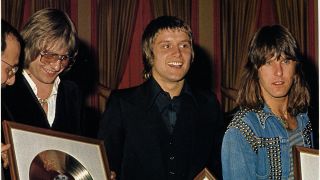
Lake’s Still… You Turn Me On is one of his dreamiest acoustic songs. These had always provided dynamic contrast to ELP’s power play, both live and on record, and here Emerson joins in on harpsichord. Was the idea that the song was addressed to a certain person in the audience?
“Only nominally,” Lake replies. “When I think about the lyric, I’d
think about a face in the audience looking up at me. When the audience looks up on the stage they see a star, but a star is just a perception, so it was a concept that I was trying to voice, but in a romantic way.”
Benny The Bouncer is the one aberration on the album, a couple of minutes of knockabout light relief – one of the group’s “nonsense songs”,
as Emerson puts it.
“When I was very young I used to sometimes play shows with The Gods at Salisbury City Hall,” says Lake. “There was a bouncer there and he was fucking huge! He must have been six foot three; he was a massive guy. He never did anything because no one would ever dare say anything to him. But he is Benny The Bouncer and the Palais De Danse is Salisbury City Hall.”
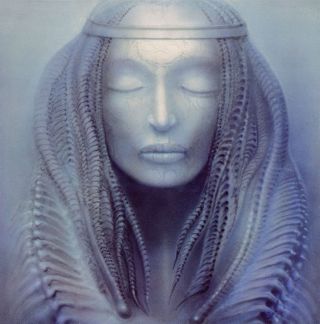
The bulk of Brain Salad Surgery, though, is the three-part suite Karn Evil 9, which ranks as their most ambitious and original half hour of music, largely written by Emerson. “In between going back home from tour, mowing the lawn and saying ‘Hi’ to the wife and kids, I’m not sure how I managed to write all this down,” he laughs.
“But I wrote it on manuscript paper and presented it to Greg and Carl. The first part of First Impression [as the constituent parts are titled] used a lot of counterpoint and that worked well. Occasionally we used to make music up from blues jams, which could be fun, but I didn’t always think that it was satisfactory.”
Lake still sounds delighted about how Emerson’s music was “a perfect platform” for the lyrical concept he had been hatching up with his old King Crimson buddy, lyricist Pete Sinfield, whose family had connections with the circus.
The first section of First Impression is full of warnings and ominous portents, visions of a future dystopia. But right from the rehearsals in the cinema, Lake had in mind the idea of theatre, a unique performance, something happening in real time.
“There’s a character, like a ringmaster, who says, ‘Welcome back my friends to the show that never ends,’ Lake recites. “It’s slightly cold. ‘We’re so glad you could attend, come inside, come inside…’ There’s a wry smile that goes with it.”
Once we have accepted this rather sinister invitation, we are presented with a surreal parade of ‘rows of bishops’, ‘heads in jars’, ‘a real blade of grass’, ‘a bomb inside a car’, and alongside these peculiarities, ‘seven virgins and a mule’, a combination which promises some particularly transgressive entertainment.
The music is fittingly spectacular, and charged with characteristic energy. It evokes Bach, Bernstein and futuristic R&B, woven through with Emerson’s serpentine synth lines. Palmer navigates these currents with a single-minded intensity, while Lake reminds us of his roots before his bass-playing days with some nifty, melodic lead guitar motifs.
The instrumental Second Impression begins as a hyperactive piano trio – somewhat akin to Palmer’s beloved Jacques Loussier – before hitting a Latinate groove, like music heard wafting from some sci-fi barrio.
“I had been on holiday in Trinidad and I got this crazy sound on the Moog, which sounded quite like steel pans,” says Emerson. “Carl really got into the rhythm of that one and it was a little more light-hearted than the serious mood of the other Impressions.”
A strange, sparse section, a nocturne redolent of empty streets, leads us back into the initial piano theme.
There’s no let up into the Third Impression, with its synth fanfares ushering in anthemic verses. Lake describes how the lyrics follow on from the First Impression. “I really can’t tell you quite what the connection was, but the next thing to pass by was this concept of the future.”
His co-lyricist, Pete Sinfield, had also been a computer programmer, but in the 1970s, few people had even come across such a device: “There weren’t even fax machines,” Lake explains.
And to many they represented the unknown and also the unnatural and impersonal in a potentially threatening way. One only needs to think of HAL 9000, the spaceship’s computer in Stanley Kubrick’s film 2001: A Space Odyssey, who, becoming sentient, turns against his masters.
The sections with the protagonist arguing his existential case with the spaceship’s bridge computer might seem a bit dated now, but Lake is unabashed.
“Pete and I got onto the idea of a world where computers actually take over from people, and the more we thought about it, the more sense it made. It was prophetic. The line in the song was, ‘Load your programme, I am yourself’, and I predict that it won’t be so long before computers will have almost a genetic capacity for knowing their owners, and the more control it would take, the more of your life it would consume. As the first step along the way, we have already become cellphone dependent.”
Brain Salad Surgery reached Number Two in the UK chart and Number 16 in the US. Reactions to the album were mixed, but by this time Emerson Lake & Palmer had largely given up on press support. It was a smaller world in the 70s and the music press ostensibly had more power than they do now, but then ELP had more power than the press.
Lake says, “The interesting thing is it made absolutely no difference – the journalists would slag us and the people decided who they liked. I think it was at the Royal Festival Hall where we decided to put in our concert programme a scathing review by John Peel, who said we were ‘a waste of talent and electricity’. It had become almost de rigueur to knock ELP.”
This feature originally appeared in issue 44 of Prog Magazine.
